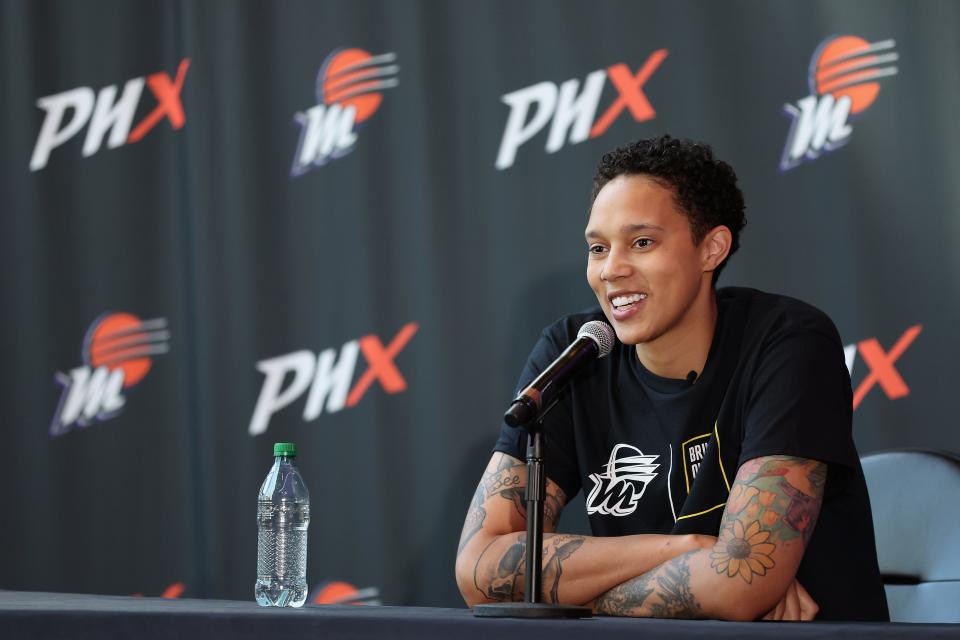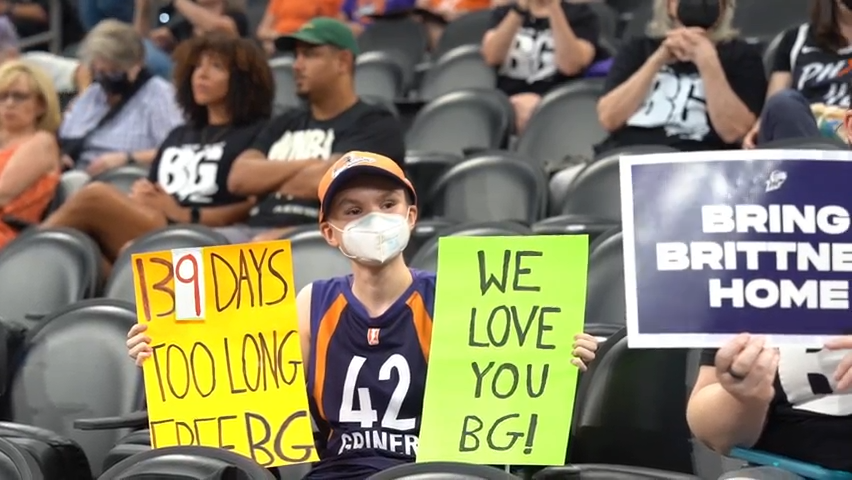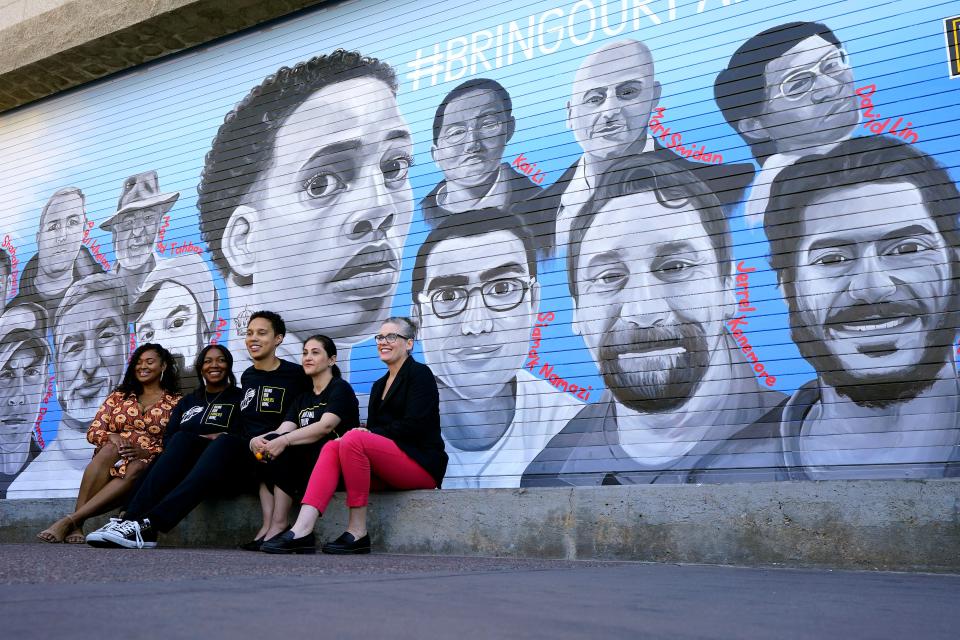To free Brittney Griner from Russia, WNBA sisters and LGBTQ community got loud
There were times, stuck in a Russian prison cell 6,000 miles from her family, friends and teammates, that Brittney Griner felt wracked with hopelessness.
That vulnerability was on display last summer when Griner, a two-time Olympian and one of the greatest athletes of her generation, sent a letter to President Joe Biden as she awaited trial in Moscow after being accused of carrying cannabis oil in her luggage in mid-February 2022.
"As I sit here in a Russian prison, alone with my thoughts and without the protection of my wife, family, friends, Olympic jersey or any accomplishments, I’m terrified I might be here forever," she wrote.
The fear of being forgotten crushed her. Then she’d open correspondence from her wife, a random fan or, often, one of her basketball sisters. Instantly, she’d feel her spirit lift.
"You don’t understand how good it felt to get a letter," explained Griner on April 27, her voice thick with emotion and her eyes glassy with tears. It was the first time she’d spoken to the media since returning. "It lets you know you’re not forgotten. It just does something to you, gives you a spark of life, to keep holding on to the fight."

Back home, that fight was led by the basketball community, including former great players-turned-coaches like Dawn Staley and members of the NBA. But the battle for Griner’s freedom was spotlighted more than anyone by her immediate WNBA family, a group of about 140 women who fought harder and louder than anyone to get her released, fitting for a league with a long history of activism.
Detained in mid-February 2022, convicted in August and sentenced to nine years in a Russian penal colony − a system notorious for its brutality − Griner’s harrowing ordeal came to an end in December, when the Biden Administration traded Griner for Russian arms dealer Viktor Bout.
She landed in Texas on Dec. 9 and immediately asked to do what the imposing 6-9 center is known best for: Dunk a basketball.
It was good, Griner said, to see she could still "throw this thing down." It turns out that even after the game she’s devoted her life to led her to becoming one of the most high-profile hostages in American history, Griner continues to love, and find freedom in, basketball.
"It’s still a sanctuary," she said.
Centering Griner's Black, queer identity
It’s hard to decide which was more impressive at the April 27 news conference: Griner’s upbeat demeanor or her mere presence.
For months, many feared she might never make it home. That she did is a testament to the behind-the-scenes work from negotiators in and out of the U.S. government, but also, to her WNBA sisters.
Griner’s situation was unusual considering hundreds of Americans, men and women, have played overseas for decades, including in a handful of dangerous countries, and never been taken hostage.
But it was also unique because as an openly queer Black woman, Griner’s identity could not be ignored.

For decades in sports, women athletes have been expected to fit a particular stereotype: white, straight and feminine. Griner has eschewed that since turning pro in 2013, coming out publicly before being drafted No. 1 overall by Phoenix and becoming the first out LGBTQ athlete endorsed by Nike. Throughout her career, she's spoken frequently and passionately on the importance of supporting the queer community. During her detainment, her wife Cherelle was front-and-center, too.
"There’s been a real shift the last few years, led by the WNBA, in terms of athletes being much more out front with their sexuality and gender identity," said Susan Cahn, a University at Buffalo professor who specializes in gender and sexuality in sports. "That league has so many out lesbians that they’ve helped normalize that, and shown you can still market the league − and Griner has led the way.
"She was one of the early people to come out and she spent years paying a price for that, but also paving a path for more people to be out. She has a lot of respect along those lines."
And yet, given the geo-political sensitivity of the situation, initially everyone close to Griner was told to keep quiet, worried that drawing attention to her detainment − and her identity − could put her in serious danger.
"Early on, there was a very real fear about the fact that her being a Black, queer person was going to harm her," said Layshia Clarendon, a WNBA veteran who is the league's first out non-binary and transgender athlete. "That was a tangible thing. It was strategic to not highlight those points, given the country she was in."
But when given the OK to talk about her situation, the WNBA and LGBTQ community centered Griner’s identity, using it as a rallying cry of sorts.
"BG being detained, it challenged the notion of who gets to be American, who gets to be a patriot," Clarendon said. "It’s very different than the cisgender, white military dude from the Midwest getting detained, which is usually what we think of.
"You have to look at the history of Blackness and cannabis and how it’s been criminalized and who’s been criminalized for it, who’s been blamed for it. The way BG was blamed (for being detained) and the narrative around that, the racism in it, you didn’t have a lot of people initially saying, 'Oh I can see myself in her and sympathize with her' …
"She found herself at the intersection of all that. You can’t untangle her identity from what she went through."
WNBA has long history of activism
As the smallest professional sports league in the U.S. — there are only 12 teams, with a max of 12 players on each roster — the WNBA is unique in its camaraderie. Before Griner's news conference on April 27, ESPN analyst Rebecca Lobo explained on air why the league and its players are so close.
"Because so few women play in this league, it’s a pretty strong sisterhood," Lobo said. "It was striking, when I was traveling around calling games, the outpouring of love and support and concern for BG. It was something that really weighed on all the players."
Once the Biden Administration labeled Griner as "wrongfully detained" on May 3, 2022, WNBA players got loud, imploring others to get involved, too. The league put her initials and number, BG42, on every court. Numerous NBA players and coaches talked about her and wore shirts with her face emblazoned on them. Some WNBA athletes, including former MVP Breanna Stewart, posted daily on their social media channels, calling for the White House to do whatever necessary to bring Griner home.
In D.C. for a game against the Washington Mystics in June 2022, Griner’s Phoenix Mercury teammates met with State Department officials to get details on the work to free Griner. Letter-writing campaigns popped up across the league, as supporters urged Griner to keep faith because back home hundreds, if not thousands, were fighting for her release. Griner said knowing her WNBA family and the LGBTQ community at large were rallying around her helped her through detainment.

"Just seeing everybody backing me and supporting me, supporting my family, I heard about the standing ovation my wife got when she came to a (Phoenix) game," Griner said on April 27. "Little things like that, knowing that everyone was going above and beyond, people I’ve never met going to bat for me and supporting me, it really shows how much you’ve impacted or touched so many different people in different ways. I was just abundant of joy (because of that)."
For the WNBA, activism is nothing new. While protests among athletes became commonplace in the summer of 2020 after the murder of George Floyd, and even before with the protest movement in the NFL with Colin Kaepernick, the WNBA had done it years earlier players were fined for wearing “#BlackLivesMatter” shirts in 2016.
In late 2020, the league worked openly to unseat Atlanta Dream owner and then-U.S. Senator Kelly Loeffler, a Republican, after she made derogatory comments about the Black Lives Matter movement. After losing her re-election bid to Democrat Raphael Warnock — which flipped the Senate blue — Loeffler was pressured to sell her ownership stake in the Dream. One of the people to step into Loeffler’s place was former WNBA player Renee Montgomery.
The activism continues for Griner, too. At her April 27 news conference, Griner detoured briefly from her story to speak out against the wave of anti-transgender legislation banning trans athletes from sports saying: “It’s a crime, honestly, to choose to separate someone for any reason.”
The pure existence of their league, numerous players have said over the years, is a form of resistance. And their activism has made an impression, to say the least. "I've never seen a league with better politics," said Cahn, the Buffalo professor.
Griner will continue her work in political circles, too, pledging to bring awareness to other Americans still detained around the world. Clarendon, the WNBA veteran, said Griner’s promise to keep reaching back and elevating the names of other detainees is just “another reminder of how Black women’s liberation is tied to everyone’s liberation.”
As for Griner’s continued impact in the LGBTQ community at large, Cahn believes it can be immense.
"I hope that having someone that high profile, who was of national political concern − instead of just being known in the sports world − will help fight against homophobia," she said.
Cahn believes Griner’s human characteristics such as her playfulness, generosity and her big-hearted nature can be huge assets. "Those qualities are immediately apparent to people who meet her," Cahn said. "She breaks a lot of barriers."
Meanwhile, the symbiotic connection between Griner and the WNBA community, and how both parties bond over activism, has been on display since Griner’s return — and will likely always exist.
"I hope what happened to BG and how we fought for her, that’s a reminder, as our league has shown multiple times, that if you come for one of us, you come for all of us," Clarendon said. "We saw that with Kelly Loeffler’s comments, with me being a sort of transgender figurehead and the support I feel from the W.
"That’s the heart of our league − the players have each other’s backs."
Follow sports enterprise reporter Lindsay Schnell on Twitter at @Lindsay_Schnell
This article originally appeared on USA TODAY: To free Brittney Griner from Russia, WNBA and LGBTQ community got loud

